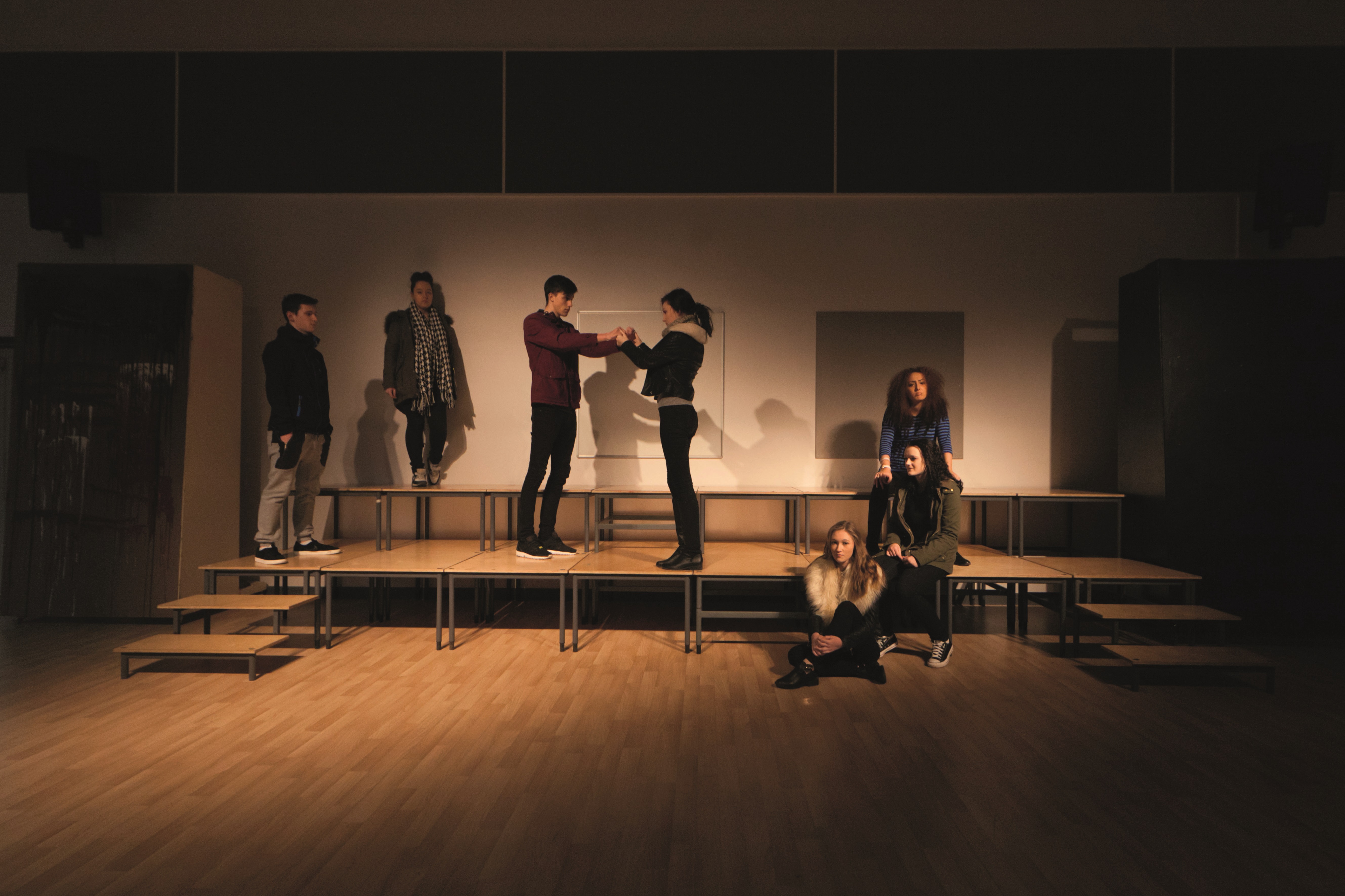
Dramatic Arts
Intent Statement
The Dramatic Arts department intends to Inspire students to create their own work through the study of practitioners and existing text. This inspiration will be nurtured and progressed to maximise achievement and confidence. Students may wish to continue their study to degree level and the department intends to prepare them fully for this by operating an independent working ethos, with a high degree of creativity and self-exploration. In terms of performance- the department intends to push the boundaries of typical theatre and examine visual, aural and spatial elements to create innovative and thought-provoking work.
Department Information
The Drama specification is diverse, practical and accessible to students of all abilities. Drama engages and encourages students to become confident performers and designers with the skills they need for a bright and successful future. The Arts Industry is the fastest growing industry in the UK. The ability to communicate effectively and have confidence in yourself, is important in every vocation, but most importantly in life.
Key Stage 5: Performing Arts
Course Title: Level 3 Cambridge Technical Extended Certificate in Performing Arts 2016 Suite
Syllabus: OCR
The course is exciting and diverse, focusing on the skills of the individual. Students will find a healthy balance with practical and theoretical learning, devising and experimenting in numerous performances throughout the course. Learners must be able to work as part of a team and individually and the course builds these skills through themed work, offering them a chance to let go and enjoy learning creatively, empowered and inspired.
Entry Requirements
This qualification is for learners who are 16 years old or over and want to study the performing arts. It’s not just about being able to perform on stage; it will provide learners with the skills, knowledge and understanding to progress onto a higher education Performing Arts programme or specialist performance degree, such as Drama and Theatre Arts. We recommend a grade 4 or above in an Arts subject as well as a Grade 4 or above in English.

How the course is taught
The course is taught through practical and creative learning. Students are required to be independent and imaginative as they often are in control of their own learning.
Year 12
• Unit ONE: Prepare to work in the Performing Arts sector
• Unit TWO: Proposal for a commissioning brief
• Unit SIX: Improvisation
These units will give learners an understanding of the Performing Arts in wider contexts, including the way the sector works, job roles, and progression opportunities, how to build strategies for sustaining a freelance career, and how to plan and develop projects. Learners will study the work of Performing Arts practitioners and learn how to demonstrate practical ideas for Performance.
Year 13
• Unit THREE: Influential Performance Practice
• Unit FOUR: Combined Arts.
Learners will develop transferable skills such as Planning, Communication and Adaptability. The Extended Certificate will give learners the skills, knowledge and understanding of the Performing Arts which, gained alongside other vocational or academic qualifications.
How is the course assessed?
Internal and External Moderation on both Performance and Portfolio work.
Career Opportunities
Any career that involves working with people will benefit from this subject. The course builds social and life skills resulting in improved confidence and thinking skills. Students have the opportunity to work with local businesses and the community and several performing opportunities to show case their talents. Actors and actresses will become more aware of devising skills and teachers will become real team players. The Performing Arts are a preferred skill on university and job applications as it not only shapes creative thinkers, but people who have a drive to succeed.
|
Year 12 |
Year 13 |
|
Performance skills |
Practitioner Knowledge |
|
Improvisation |
Combining Style and Genre |
|
Audience Engagement |
Research and Analytical Skill |
|
Stimuli Exploration |
Combining Art Forms |
|
Industry Specific Knowledge |
Existing Repertoire |
|
Grant Funding Experience |
Presenting Skills |
|
Audition Skills |
Devising Skills |
|
Presentation Skills |
Interpretation and Deconstruction |
|
How to sell yourself at Interview |
Self-Evaluation |
Key Stage 5: Drama and Theatre
Students can develop an insight into and an understanding of a wide range of activities. Drama is an exciting, creative and challenging course and has been designed to help candidates meet those challenges. The balance between the Performance tasks and the Written Examination gives candidates the best opportunity to succeed.
Entry Requirements
A GCSE Grade 4 or above in Drama or Expressive Arts. Relevant experience with a Youth Theatre Group or involvement in the Arts is also acceptable as entry for the course.
How the course is taught
The course is taught through practical workshops, discussion and personal commitment to reading plays and visiting the theatre. There is a high standard of written work required, produced from taking notes during lessons and finalised through controlled assessment. Students are expected to rehearse after school and at weekends during exam times.
Key Stage 5: Drama and Theatre: Year 12
Course Title: AS Level Drama and Theatre
Syllabus: Edexcel
Year 12
Component 1: Exploration and Performance: 60% of the qualification: 96 marks
Internally assessed and externally moderated.
â— There are three parts to the assessment:
1) A Portfolio: typed evidence between 2000–2500 words -
2) A Group Performance Realisation of one key extract from a Performance Text and informed by the methodology of one influential practitioner.
3) A Monologue or Duologue Performance from one key extract from a different Performance Text.
Component 2: Theatre Makers in Practice Written examination: 1 hour 45 minutes: 40% of the qualification: 48 marks
Section A: Live Theatre Evaluation
â— 16 marks,
â— Students answer one extended response question from a choice of two requiring them to analyse and evaluate a Live Theatre Performance they have seen. Students are allowed to bring in Theatre Evaluation notes of up to a maximum of 500 words.
Section B: Page to Stage: Realising a Performance Text
â— 32 marks
â— Students answer two extended response questions on how they might interpret and realise an extract in Performance. It will be an unseen extract from their chosen text. Students answer from the perspective of a performer and a designer.
Key Stage 5: Drama and Theatre: Year 13
Course Title: A Level Drama and Theatre
Syllabus: Edexcel
Year 13
Component 1: Coursework: Devising 40% of the qualification: 80 marks
Devise an original Performance Piece using one key extract from a Performance Text and a Theatre Practitioner as stimuli.
There are two parts to the assessment:
1) a Portfolio- Typed Evidence between 2500–3000 words
2) the devised Performance
Component 2: Text in Performance- Coursework: 20% of the qualification: 60 marks
â— A Group Performance of one key extract from a performance text.
â— A Monologue or Duologue Performance from one key extract from a different Performance Text.
Externally assessed by a visiting examiner.
Component 3: Theatre Makers in Practice: Written examination: 2 hours 30 minutes: 40% of the qualification: 80 marks
Section A: Live Theatre Evaluation- Students answer one extended response question from a choice of two requiring them to analyse and evaluate a Live Theatre Performance they have seen.
Section B: Page to Stage: Realising a Performance Text
Students answer two extended response questions based on an unseen extract from the Performance Text they have studied.
Students will demonstrate how they, as Theatre Makers, intend to realise the extract in Performance.
Section C: Interpreting a Performance Text
Students will answer one extended response question from a choice of two based on an unseen named section from their chosen Performance Text. Students will demonstrate how their Re-imagined Production Concept will communicate ideas to a Contemporary Audience and how the work of their chosen Theatre Practitioner has influenced their overall Production Concept. This will demonstrate an awareness of the Performance Text in its Original Performance Conditions.
|
Year 12 |
Year 13 |
|
Performance Skills |
Building on the Year 12 work and reviewing skills that need enhancing based on previous result. |
|
Text Interpretation |
|
|
Audience Engagement |
|
|
Practitioner Study |
|
|
Social, Cultural Historical Factors |
Text Interpretation |
|
Monologue Skills |
Monologue Reflection |
|
Text Study |
Live Theatre Review |
|
Live Theatre Evaluation |
Study of Greek Theatre |
|
Expressing Analytical Opinion |
Performance Skills |
How is the course assessed?
Drama and Theatre will be assessed through a combination of a 40% Written Exam and 60% Coursework.
Career Opportunities
As well as the obvious vocation of an Actor, there are a number of career paths that drama supports such as Teaching, Drama Therapy, Community Work and Writer. The skills learnt within the qualification shape quick thinking team players, who can adapt skills and talk with confidence. This Self-promotional aspect can be applicable to almost every career route.
Learning Journeys
A level Drama
| Year 12 | Learning Journey - A Level Drama - Year 12.pdf |
| Year 13 | Learning Journey - A Level Drama - Year 13.pdf |
Performing Arts
| Year 12 | Learning Journey - Performing Arts - Year 12.pdf |
| Year 13 | Learning Journey - Performing Arts - Year 13.pdf |
